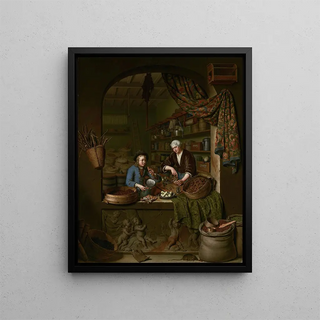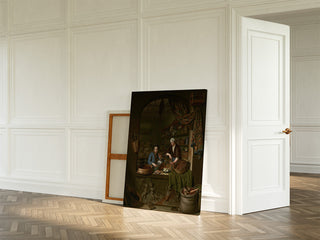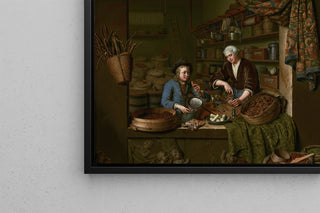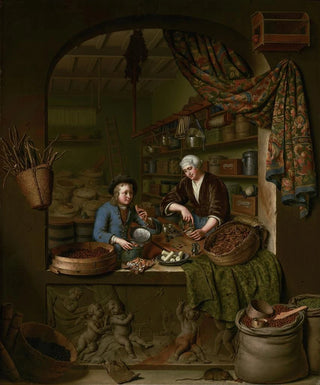Art print of a grocery store - Willem van Mieris | Art print


View from behind

Frame (optional)
Willem van Mieris, heir to the Golden Age
Born in 1662 in Leiden, Willem van Mieris was the son and pupil of the painter Frans van Mieris the Elder, a prominent representative of the Leiden school. Inheriting this tradition, Willem specialized in refined genre scenes, still lifes, and bourgeois interiors. His paintings, highly sought after by collectors of his time, stand out for their near-miniature precision and elegant atmosphere.
A genre scene full of realism
In A Grocery Store, van Mieris depicts with realism a shop overflowing with goods and supplies. Fruits, vegetables, bread, jars, and dishes form a still life of incredible richness, reflecting the era’s taste for abundance and detail. The scene is inhabited by characters whose everyday gestures – weighing, choosing, discussing – animate the composition and bring the painting to life.
Dutch symbolism and refinement
Beyond simple realistic rendering, this work illustrates the symbolism of commerce and prosperity in 17th-century Holland. The depicted goods are not chosen at random: they evoke the wealth of exchanges and the openness to the world that characterized the Dutch Republic. The viewer thus contemplates not only a market scene but also an image of the economic and social vitality of the period.
An art print that enriches your interior
The art print of A Grocery Store by Willem van Mieris is perfect for adding a touch of classic refinement to your decor. Hung in a kitchen, dining room, or living room, it highlights conviviality, abundance, and sensory pleasure. Dutch painting enthusiasts will appreciate the elegance of genre scenes, while history lovers will value its unique testimony of 17th-century daily life.
The timeless elegance of Dutch painting
By choosing this art print, you invite a fragment of the Dutch Golden Age into your home, a period when painting reached a peak of technical and aesthetic perfection. The attention to textures, the subtlety of lights, and the balance of composition make this work a true masterpiece, now accessible to embellish your walls.

Matte finish

View from behind

Frame (optional)
Willem van Mieris, heir to the Golden Age
Born in 1662 in Leiden, Willem van Mieris was the son and pupil of the painter Frans van Mieris the Elder, a prominent representative of the Leiden school. Inheriting this tradition, Willem specialized in refined genre scenes, still lifes, and bourgeois interiors. His paintings, highly sought after by collectors of his time, stand out for their near-miniature precision and elegant atmosphere.
A genre scene full of realism
In A Grocery Store, van Mieris depicts with realism a shop overflowing with goods and supplies. Fruits, vegetables, bread, jars, and dishes form a still life of incredible richness, reflecting the era’s taste for abundance and detail. The scene is inhabited by characters whose everyday gestures – weighing, choosing, discussing – animate the composition and bring the painting to life.
Dutch symbolism and refinement
Beyond simple realistic rendering, this work illustrates the symbolism of commerce and prosperity in 17th-century Holland. The depicted goods are not chosen at random: they evoke the wealth of exchanges and the openness to the world that characterized the Dutch Republic. The viewer thus contemplates not only a market scene but also an image of the economic and social vitality of the period.
An art print that enriches your interior
The art print of A Grocery Store by Willem van Mieris is perfect for adding a touch of classic refinement to your decor. Hung in a kitchen, dining room, or living room, it highlights conviviality, abundance, and sensory pleasure. Dutch painting enthusiasts will appreciate the elegance of genre scenes, while history lovers will value its unique testimony of 17th-century daily life.
The timeless elegance of Dutch painting
By choosing this art print, you invite a fragment of the Dutch Golden Age into your home, a period when painting reached a peak of technical and aesthetic perfection. The attention to textures, the subtlety of lights, and the balance of composition make this work a true masterpiece, now accessible to embellish your walls.









